Hockey Legacy Manager 25 is the newest iteration of the franchise simulation game that releases each year on both mobile and PC and has other relatives set in the football, basketball, and baseball worlds. The game promises fast simulation, a real-time engine, and a lot of customization options. The game is currently available on Android, iOS, Steam & Epic. Let’s see how it behaves in this comprehensive review.
Introduction and Game Modes
HLM 25 is a game where the user is meant to be a general manager (GM) and a head coach of their favorite team in the hockey world. If you fancy over the New York Rangers‘ latest blockbuster trade or if you want to see whether you can re-sign your starting goalie to a favorable contract before the puck drops for the new season, then this game is for you. This is not an “arcade” game where the user is supposed to move players around with their joystick, rather, you will have to patiently see your prospects grow, tinker with your line management, and try not to mess up everything going into “cap hell” by the third season – the more you win, the more money your players will want, isn’t it?
All this is reflected quite well in the game, but we’ll return to this later. The game features several modes you can enjoy. The first, and simplest, is Career Mode, where you take your favorite team, or whichever one you prefer, and lead it to glory (possibly without messing up too much.) Next is History Mode, where you can pick a specific year from the past and start playing. I’m not really interested in this kind of mode, and thus I didn’t explore them too much, but I don’t doubt that the developer (yes, it’s mostly a one-man show, which is impressive) did a great job here as well. Finally, there is the Challenge Mode. And this will be a real challenge: you have 32 challenges where you must win the Cup by the 2026-27 season with each of the NHL teams, starting with the Tampa Bay Lightning. To unlock further challenges, you must complete the previous ones.
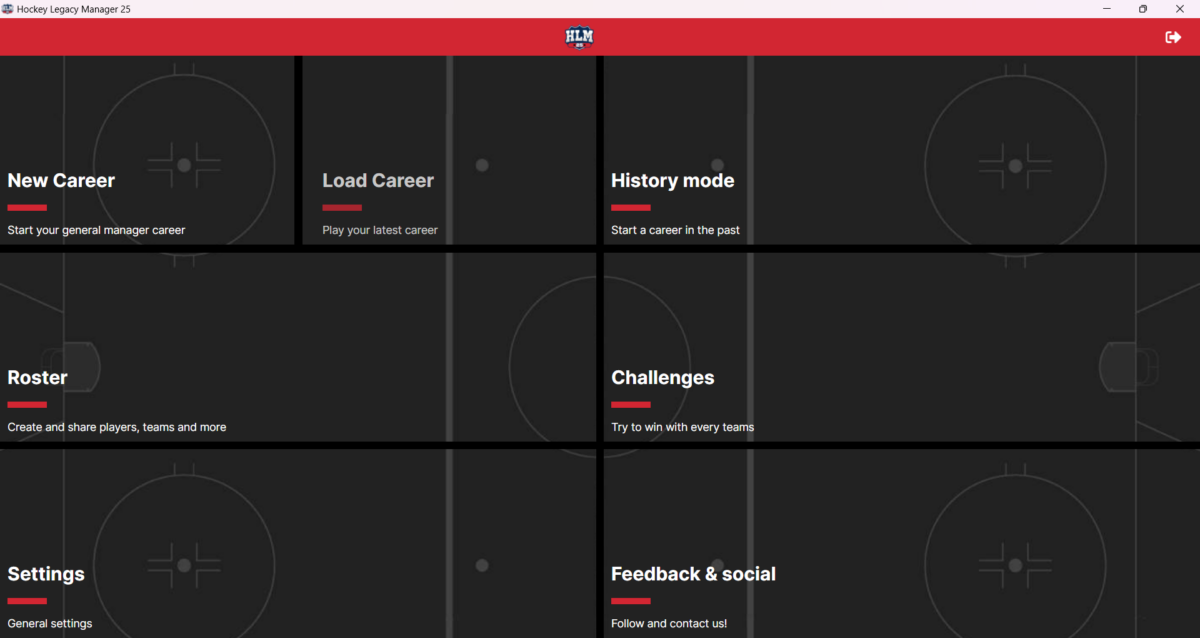
At this point, however, one last thing must be taken into consideration. The game doesn’t have NHL official licenses, so it will have scrambled names. The community comes to rescue, with several sets of rosters. Click on the Roster tab, and in the Community Roster section, you’ll find multiple options to choose from. You can take the most updated roster and enjoy real names, logos, the latest transfers, and more. You can also create your own rosters or edit the community rosters as well.
Gameplay
To start with the most obvious, HLM promises fast gameplay, and that is spot on. Via the calendar screen, you can simulate entire seasons in a few minutes While doing this is generally not a good idea, as the AI will take over and will set lines, renew contracts, sign players, and more, you may want to simulate forward two or three seasons and start playing from there or whatever other reason. This speed, however, can also be felt in day-to-day simulation, which is very fast.
You can start your career as the boss of any of the 32 NHL teams. Theoretically, you can also play in other leagues. I tried having a run in the Kontinental Hockey League, but the game presented me with strange things, like NHL stars playing on random Russian clubs, therefore for now I’d stick with the NHL. When you accept terms with your favorite team, you will be presented with a welcome message, and a plethora of things to do. Yes, being a GM isn’t easy.
To help manage everything, the game has several screens and a good user interface. If it’s your first time, the best thing is to click on “Tutorial” on the low part of the left pane that will bring you to a game manual. Then, probably the best idea is to study your roster. I’d suggest at this point to thoroughly read the “Potentials and Motivations” section of the manual to understand the key concepts of players development in the game. Each player is different and has his own path—this is well reflected in the game, but you need to take careful consideration of the different color shades that indicate the chances a player has to reach — and even surpass — his potential.
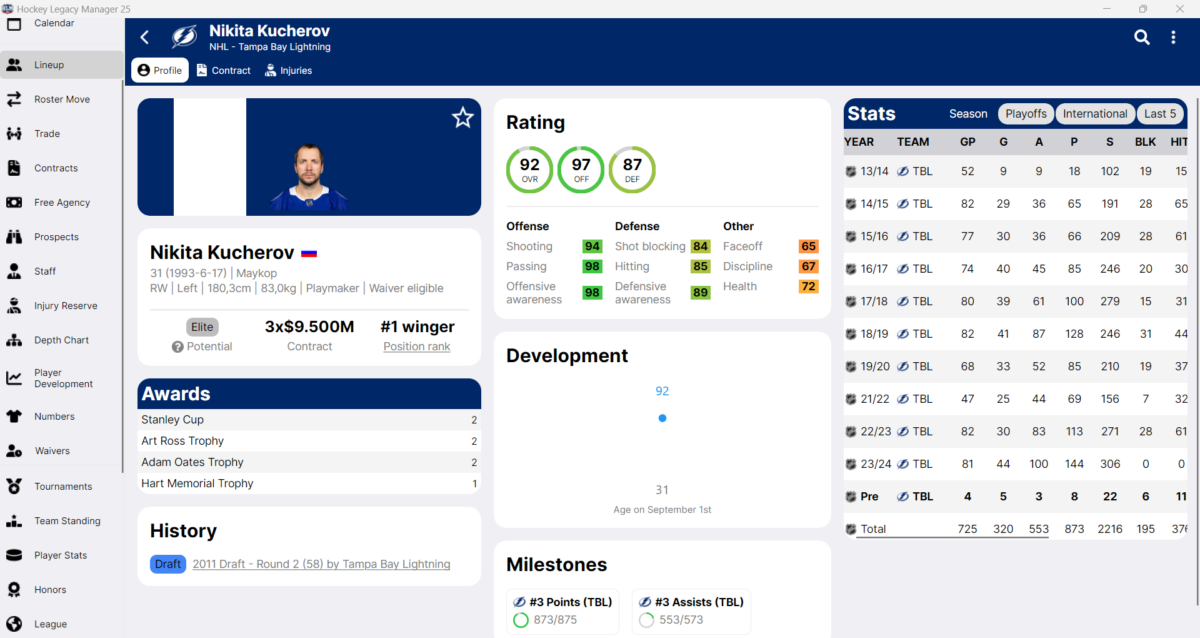
Here, admittedly, the learning curve can be steep. This is why starting a game with your favorite team is a good idea, as you already know the players and can try to mimic real-life line combinations to try and replicate what happens. There are several schemes available that will tell you which kinds of players work well together—of course, putting two grinders and one sniper is hardly a good choice, and the game makes a good job in awarding ideal combinations over other ones.
A nice novelty for the 25 version is the inbox system. You will get several emails that inform you about what happens around your team and the league, and you’ll occasionally get the most coveted message in this type of game: a trade offer. More on this later. You can simulate day-to-day, or you even several weeks at a time, but I’d advise against the latter if you want to have more control over your team. Then, you can set your lines, promote and demote players, have a look at your cap situation and you can start the preseason.
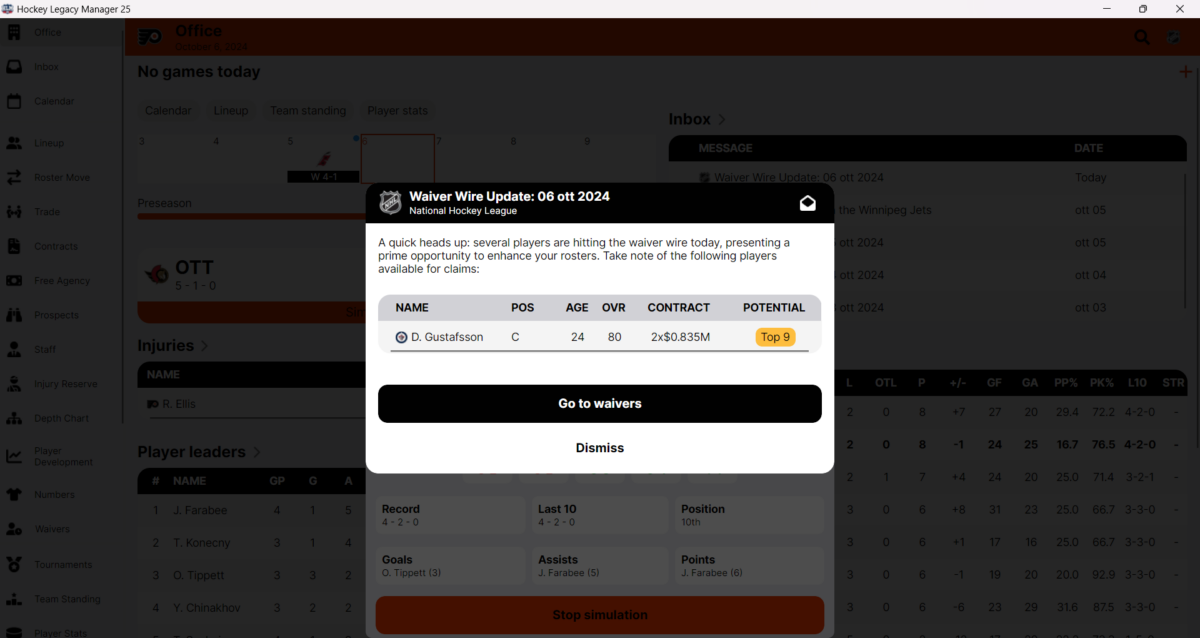
Realism
As you continue playing, you will be offered trades or will need to initiate one, whether for cap reasons or to shuffle your roster after a losing streak. In the trades screen, a bar underneath the players involved will get you a quick view of how the game reads the trade, gauging the “advantage” a team has over the other side, and most of the evaluations make sense. The situation of each is taken into consideration: rebuilding teams won’t be keen on trading away their first-round picks, and so on. The result is a fairly realist trade engine that generates quite realistic offers.
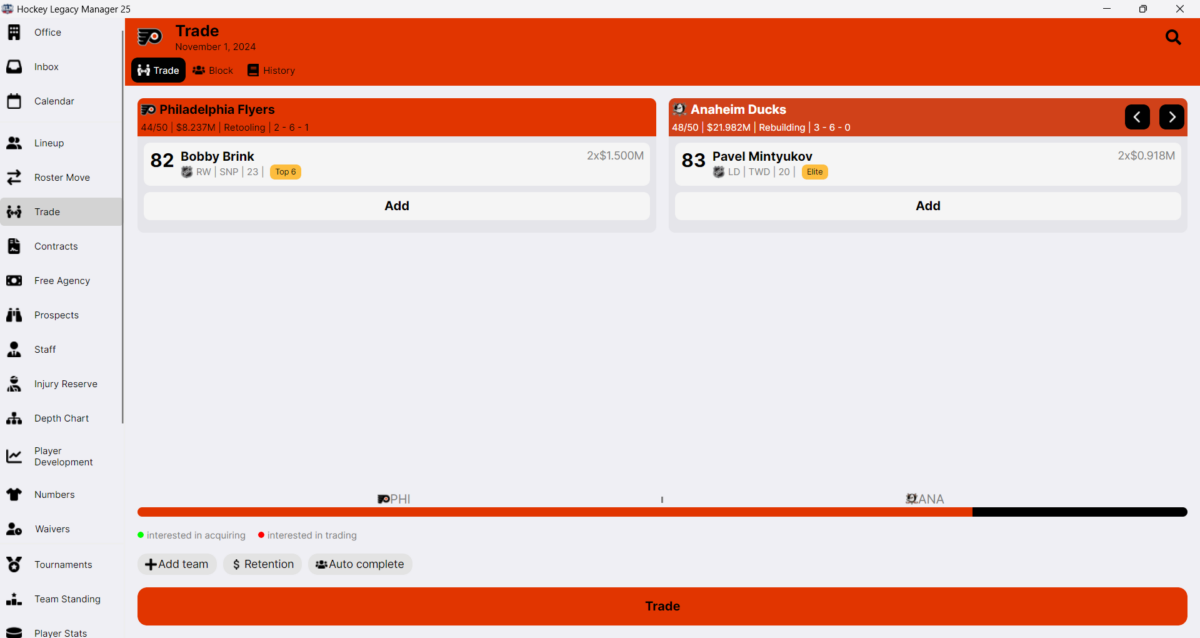
You won’t accept all the offered trades, but generally, the proposals aren’t lopsided. The same can be said for AI trades. A game will hardly ever replicate human behavior, which can be irrational at times, but it makes a good-enough job, even if judged by the fact that this is a GM-type game, where realism is of paramount importance.
Contracts are also handled well, although the only feedback you have is the level of interest the terms generate for the player. The final result isn’t bad, as players generally end up where they would in real life. However, I would prefer a system where a virtual GM has more control over negotiations—perhaps trying to convince players that next year the team won’t be in rebuilding mode (though this could backfire), and similar scenarios.
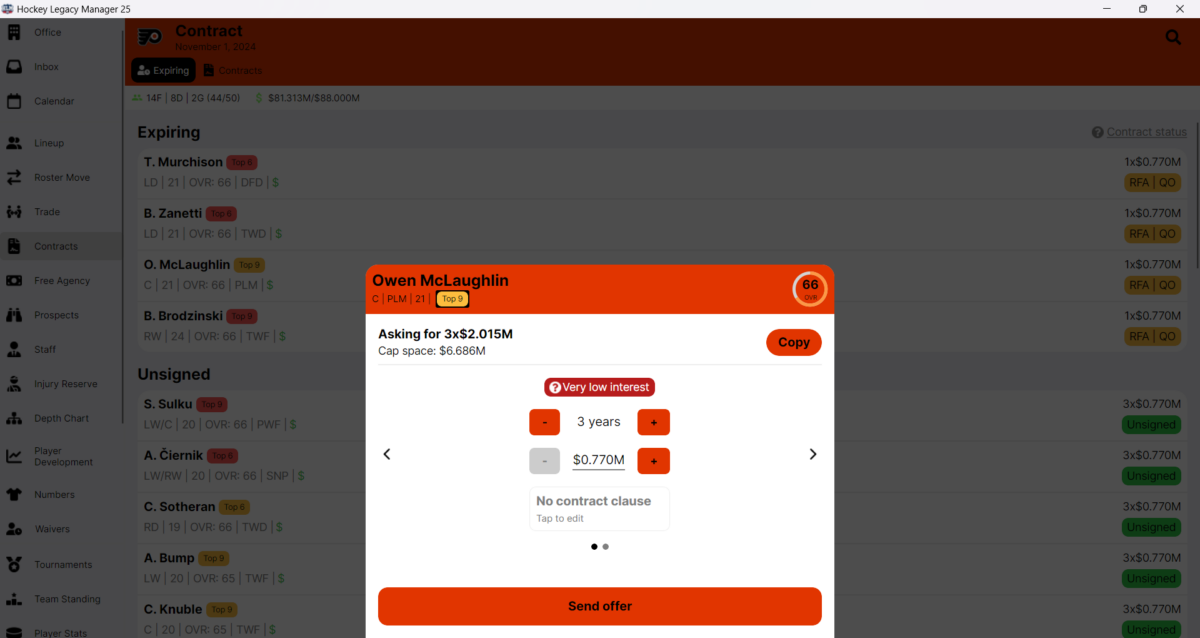
Lastly, let’s talk about realism in the outcomes. The game gives realistic results, and winning games isn’t easy. The actual game representation is a bit bland, and there’s a lot of potential that will most likely be explored in future iterations of the game. At this point, except for very important clashes, simulating games is probably the best choice for most players. The play-by-play generates events like goals, hits, shots, and penalties, but it doesn’t seem like you can actually do anything. Moreover, it would have been nice if goals were more highlighted—you don’t have a pause, a flashing text, or any other indicator, and you need to be very attentive to notice when a goal is scored.
Hockey Legacy Manager 25: The Verdict
Hockey Legacy Manager 25 is a great dive into the world of GM games. It delivers what it promises: fast gameplay, realistic results, and many customization options. The price is great for the thousands of hours you can spend on it, and you can play on both PC and mobile with the same engine, although I’m not sure how comfortable it would be on a smartphone. Moreover, the developer is really responsive to his users: bugs are ironed out fast and updates are regular. However, there are a few downsides: games are quite bland, tactics are limited to line combinations, and last but not least, the learning curve can be steep, as the game feels overwhelming at first.
However, it’s well worth it, as soon you’ll start seeing the team much better through a GM’s eyes and will ultimately understand how hard it is to build a winning team, manage contracts and prospects, and keep the fans happy. But the reward can be outstanding: the Cup is yours—even if it’s just a virtual one.
| The powerplay | In the penalty box |
| + Very realistic simulation | – Games are bland |
| + Fast gameplay | – Users don’t have much control over contracts |
| + The game is well supported by the dev and the community | – Steep learning curve |
Final rating: 7.9/10